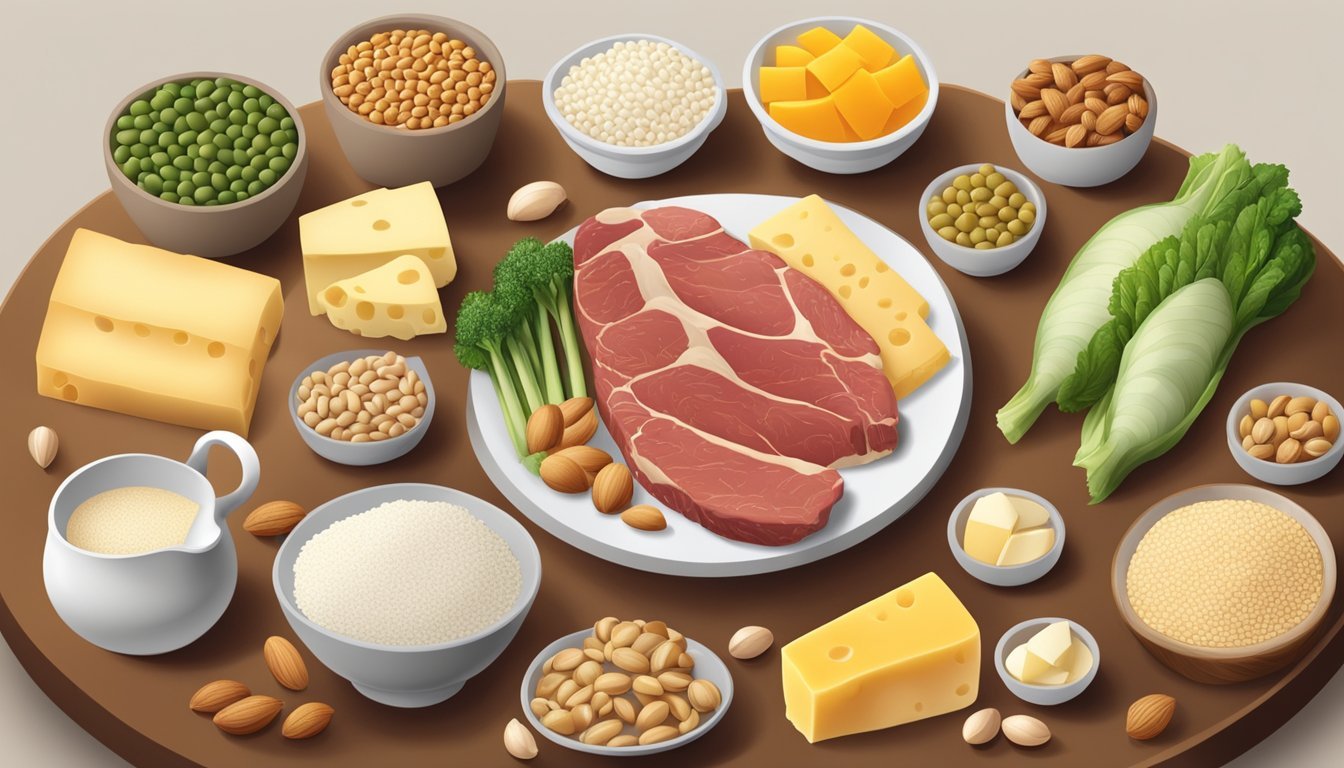Top 10 Foods High in Leucine for Muscle Health
Essential Sources for Muscle Growth
Leucine is an essential amino acid critical for muscle growth, tissue repair, and maintaining proper blood sugar levels. Many people seek to optimize their diet by including foods rich in leucine, which supports overall health and physical performance.
Understanding which foods are high in leucine can help individuals meet their dietary needs efficiently. By including specific leucine-rich foods into their daily meals, they can enhance their muscle health and contribute to their general well-being.
1) Chicken breast
Chicken breast is an excellent source of leucine, an essential amino acid important for muscle protein synthesis.
Per 100 grams, chicken breast contains approximately 2.5 grams of leucine, making it a highly effective protein source.
It also provides 32 grams of protein within those 100 grams, making it lean and nutritious.
Additionally, chicken breast is rich in essential amino acids, particularly lysine. It also supplies vital nutrients like niacin and vitamin B6, which are crucial for metabolic processes.
Compared to many other foods, chicken breast presents a high protein-to-calorie ratio, with 165 calories per 100 grams. This makes it ideal for those aiming to build muscle without excessive calorie intake.
Thus, incorporating chicken breast into dietary plans can efficiently support muscle growth and overall protein intake.
2) Canned Tuna
Canned tuna stands out as a rich source of leucine, an essential amino acid crucial for muscle building and repair. A 3-ounce serving of canned tuna provides approximately 1,833 milligrams of leucine.
In addition to leucine, canned tuna offers a significant amount of other essential nutrients. These include omega-3 fatty acids, which are beneficial for heart health, and a range of vitamins like vitamin A, B6, B12, and D.
Both white albacore and skipjack tuna are commonly available options. While white albacore tuna tends to be higher in calories and omega-3 fats, both types provide similar health benefits and nutrient profiles.
Canned tuna is a versatile ingredient that can be easily added to salads, sandwiches, or pastas, making it a convenient option for increasing leucine intake. It is also a budget-friendly source of high-quality protein.
For the best nutritional value, choose tuna packed in water over oil-packed varieties, as the latter can add unnecessary calories and fat. Always check labels for sodium content, particularly if you are monitoring your salt intake.
3) Salmon Fillet
Salmon fillet is a rich source of leucine, an essential amino acid important for muscle protein synthesis.
Wild-caught salmon is preferred due to fewer health concerns compared to farmed salmon. A small fillet of salmon can provide a significant percentage of your daily leucine requirements.
In addition to leucine, salmon is also packed with omega-3 fatty acids which offer numerous health benefits for heart and brain function.
Including salmon fillet in the diet is beneficial for those looking to increase their intake of high-quality protein and healthy fats. This fish is versatile and can be incorporated into various dishes.
4) Lean Beef Steak
Lean beef steak is a potent source of leucine, an essential amino acid crucial for muscle repair and growth. This cut of beef provides substantial protein, supporting those aiming for increased muscle mass.
Broiled lean beef flank steak offers a rich amount of leucine, making it a popular choice among athletes and bodybuilders. A 3-ounce serving of this steak delivers approximately 1881 mg of leucine, fulfilling a significant portion of the daily recommended intake.
Choosing lean cuts over fattier options is beneficial for maintaining a lower calorie intake while still gaining necessary nutrients. Incorporating lean beef steak into meals can help boost not only leucine intake but also other essential vitamins and minerals such as iron and zinc.
Preparing lean beef steak as part of a balanced diet can enhance muscle recovery post-workout. For those monitoring their fat consumption, it's advisable to trim any visible fat before cooking.
Pairing lean beef steak with a variety of vegetables and whole grains ensures a well-rounded meal. This approach supports both muscle health and overall nutritional needs, making lean beef steak a versatile and valuable component of a protein-rich diet.
5) Egg Whites
Egg whites are an excellent source of leucine, an essential branched-chain amino acid vital for muscle protein synthesis.
One hard-boiled egg white contains approximately 500 milligrams of leucine, making it a convenient option for boosting daily leucine intake.
Egg whites are low in calories and fat, making them a preferred choice for those seeking a lean protein source. Additionally, they are free from cholesterol, which can be beneficial for individuals monitoring their cholesterol levels.
Due to their high protein content and leucine levels, egg whites are commonly included in the diets of athletes and bodybuilders to aid muscle recovery and growth. They can be easily incorporated into various dishes, from scrambled eggs to protein shakes.
Egg whites are also versatile in culinary applications, suitable for both savory and sweet recipes. They offer a neutral taste, allowing them to blend seamlessly with other ingredients without altering the dish's flavor profile.
6) Turkey Breast
Turkey breast is a highly nutritious and lean source of protein, commonly recommended for its health benefits. Rich in leucine, an essential amino acid, turkey breast supports muscle protein synthesis, making it a popular choice for those aiming to build muscle or maintain muscle mass.
A 6-ounce serving of roasted turkey breast contains approximately 3177 mg of leucine. This amount provides 116% of the Recommended Daily Intake (RDI) for leucine. Such a high concentration makes turkey breast one of the top sources of this vital amino acid.
Aside from leucine, turkey breast is also packed with other essential amino acids and nutrients. It is low in fat and calories, making it suitable for those on calorie-restricted diets. It's also rich in vitamins and minerals, including niacin and vitamin B6.
For those looking to diversify their protein sources while maximizing leucine intake, turkey breast stands out as a versatile and beneficial option. It can be grilled, roasted, or added to various dishes, providing both nutritional value and culinary flexibility.
7) Greek Yogurt
Greek yogurt is a nutritious option that is high in leucine. This dairy product stands out due to its high protein content, which is essential for muscle growth and repair.
One serving of Greek yogurt provides a significant amount of leucine. This makes it a great addition to meals or snacks, especially for those looking to enhance their protein intake.
Including Greek yogurt in the diet can also aid in digestive health due to its probiotic content. These beneficial bacteria support a healthy gut environment.
Greek yogurt is versatile and can be enjoyed in various ways. It can be eaten plain, mixed with fruits, or added to smoothies.
For those who are lactose intolerant, there are lactose-free versions available that still offer the leucine benefits without discomfort.
8) Tofu
Tofu stands out as an excellent source of leucine, an important amino acid beneficial for muscle growth and repair.
Derived from soybeans, tofu provides a plant-based protein option rich in essential nutrients.
A standard serving of tofu contains substantial amounts of leucine, making it a valuable addition to vegetarian and vegan diets.
In addition to leucine, tofu offers other nutritional benefits such as iron, calcium, and magnesium.
It is also low in saturated fat and free from cholesterol, aligning with heart-healthy dietary choices.
Tofu's versatility in various recipes allows it to be easily incorporated into meals, ranging from stir-fries to smoothies.
Given its protein content and nutrient profile, tofu is a practical choice for those looking to increase their leucine intake without consuming animal products.
Individuals aiming to maintain or build muscle can benefit significantly from including tofu in their diet.
9) Pea Protein Powder
Pea protein powder is derived from yellow peas, making it a plant-based protein source. It's often favored for being easily digestible and having a high-quality amino acid profile.
Among the branched-chain amino acids (BCAAs) in pea protein, leucine stands out. Leucine is crucial for muscle synthesis, helping with growth and repair.
Pea protein powder is also rich in iron and arginine. Arginine is important for protein synthesis and supports cardiovascular health.
For those looking for a non-animal protein source, pea protein powder is an excellent option. Its versatility makes it easy to add to smoothies, baked goods, and other recipes.
10) Edamame
Edamame, young soybeans, are a nutrient-dense food rich in leucine. These green pods can be steamed, boiled, or added to various dishes, making them a versatile addition to any diet.
Each serving of edamame provides a substantial amount of protein, essential for muscle growth and repair. This makes it particularly beneficial for those following a plant-based diet.
In addition to leucine, edamame offers fiber, making it helpful for digestion and weight management. Its high content of vitamins and minerals, such as folate and vitamin K, supports overall health.
Edamame's taste and texture make it an enjoyable snack or complement to meals. It pairs well with salads, stir-fries, and even as a standalone snack. Increasing the intake of edamame can help meet daily leucine requirements effectively.
Benefits of Leucine
Leucine offers several essential benefits, particularly in promoting muscle protein synthesis and supporting metabolic health. Each of these benefits is crucial for maintaining overall well-being.
Muscle Protein Synthesis
Leucine plays a vital role in muscle protein synthesis (MPS). MPS is the process through which the body repairs and builds muscle tissue.
Leucine activates a protein called mTOR, which is central to the regulation of cell growth and muscle protein synthesis.
Increased leucine intake can speed up muscle recovery and growth. This is especially beneficial for athletes and individuals engaging in regular physical activity.
Adequate leucine consumption helps maintain lean muscle mass, preventing muscle wasting that can occur with aging or during periods of physical inactivity.
Metabolic Health
Leucine is also important for metabolic health. It helps regulate blood sugar levels by influencing insulin signaling and glucose production.
By enhancing insulin sensitivity, leucine can support better control of blood sugar levels. This is beneficial for individuals managing diabetes or at risk for metabolic syndrome.
Leucine may also play a role in reducing fat accumulation and promoting fat loss. Its influence on muscle mass indirectly aids in boosting the metabolic rate, which helps burn more calories even at rest.
Including foods high in leucine in one's diet can thus contribute to overall improved metabolic function and health.
Leucine in Diet
Incorporating leucine into the diet is crucial for muscle maintenance and overall health. Understanding daily requirements and how to combine leucine with other nutrients can optimize its benefits.
Daily Requirements
Leucine, an essential amino acid, is vital for protein synthesis and muscle repair. The Recommended Dietary Intake (RDI) for leucine is about 39mg per kilogram of body weight. For instance, a person weighing 70 kg (~154 pounds) should aim for approximately 2730mg of leucine daily.
Foods rich in leucine include chicken, beef, pork, fish, tofu, canned beans, milk, cheese, squash seeds, and eggs. Meeting daily leucine needs through varied sources can support muscle health efficiently.
Combining with Other Nutrients
Combining leucine-rich foods with other nutrients maximizes its absorption and effectiveness. Pairing leucine with carbohydrates and healthy fats can enhance overall nutrient uptake. For instance, consuming salmon not only provides leucine but also omega-3 fatty acids, which support heart health.
Vegetarians and vegans can pair plant-based leucine sources like tofu and beans with grains or nuts to achieve complementary protein profiles. This strategy ensures they get a complete range of essential amino acids, promoting better muscle and overall body function.
Leucine Supplementation
Leucine supplementation can be beneficial for specific groups of people, especially those who have increased muscle growth needs or dietary restrictions. Finding the right supplement and understanding who might need it is crucial for optimal health outcomes.
Who May Need Supplements
Individuals who participate in intense physical activities such as athletes or bodybuilders might benefit from leucine supplements. They require higher amounts of leucine to support muscle recovery and growth.
Older adults are another group that may consider supplementation. As people age, muscle mass tends to decline, and leucine can help prevent muscle deterioration. Vegans and vegetarians, who might not get adequate leucine from their plant-based diets, could also benefit from supplements to meet their needs.
Choosing the Right Supplement
When selecting a leucine supplement, it's important to consider the form and dosage. Leucine supplements are available in powder, capsule, and tablet forms. The ideal choice depends on personal preferences and ease of integration into one's routine.
Look for products with minimal additives and fillers for a higher-quality supplement. It's also advisable to consult healthcare providers to determine the correct dosage and ensure it aligns with individual health needs. Some supplements offer additional branched-chain amino acids (BCAAs), which can provide synergistic benefits.





